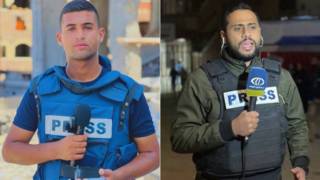
Topics
By Amy Goodman
Sami al-Haj is a free man today, after having been imprisoned by the U.S. military for more than six years. His crime: journalism.Targeting journalists, the Bush administration has engaged in direct assault, intimidation, imprisonment and information blackouts to limit the ability of journalists to do their jobs. The principal target these past seven years has been Al-Jazeera, the Arabic television network based in Doha, Qatar.
In November 2001, despite the fact that Al-Jazeera had given the U.S. military the coordinates of its office in Kabul, U.S. warplanes bombed Al-Jazeera’s bureau there, destroying it. An Al-Jazeera reporter covering the George Bush-Vladimir Putin summit in Crawford, Texas, in the same month was detained by the FBI because his credit card was “linked to Afghanistan.” In spring 2003, the U.S. dropped four bombs on the Sheraton hotel in Basra, Iraq, where Al-Jazeera correspondents—the only journalists reporting from that city—were the lone guests. Another Al-Jazeera staffer showed his ID to a U.S. Marine at a Baghdad checkpoint, only to have his car fired upon by the Marines. He was unhurt. That can’t be said for Tareq Ayyoub, an Al-Jazeera correspondent who was on the roof of the network’s bureau in Baghdad on April 8, 2003, when a U.S. warplane strafed it. He was killed. His widow, Dima Tahboub, told me: “Hate breeds hate. The United States said they were doing this to rout out terrorism. Who is engaged in terrorism now?”
Then there is the story of Sami al-Haj. A cameraman for Al-Jazeera, he was reporting on the U.S. invasion of Afghanistan. On Dec. 15, 2001, while in a Pakistani town near the Afghanistan border, Haj was arrested, then imprisoned in Afghanistan. Six months later, shackled and gagged, he was flown to the U.S. prison at Guantanamo Bay. Haj was held there for close to six years, repeatedly interrogated and never charged with any crime, never tried in a court. He engaged in a hunger strike for more than a year, but was force-fed by his jailers with a feeding tube sent into his stomach through his nose. Haj was abruptly released this week. The U.S. government announced that he was being transferred to the custody of Sudan, his home nation, but the government of Sudan took no action against him. He was rushed to an emergency room, and soon was seen on his old network, Al-Jazeera:
“I’m very happy to be in Sudan, but I’m very sad because of the situation of our brothers who remain in Guantanamo. Conditions in Guantanamo are very, very bad, and they get worse by the day. Our human condition, our human dignity was violated, and the American administration went beyond all human values, all moral values, all religious values. In Guantanamo, you have animals that are called iguanas, rats that are treated with more humanity. But we have people from more than 50 countries that are completely deprived of all rights and privileges, and they will not give them the rights that they give to animals.” He described the desecration of the Quran as part of the effort to break him: “They hold the Quran in contempt, destroyed it several times and put their dirty feet on it. They also sat on the Quran while trying to get us angry. They repeatedly committed violations against our dignity and our sexual organs.” At least one official in the Defense Department has denied the charges.
Asim al-Haj, Sami’s brother, told me in an interview last January about the 130 interrogations: “During these times, the interrogations were all about Al-Jazeera and alleged relations between Al-Jazeera and al-Qaida. They tried to induce him to spy on his colleagues at Al-Jazeera.”
According to the Committee to Protect Journalists, 10 journalists have been held for extended periods by the U.S. military and then released without charge. Just weeks ago in Iraq, the U.S. military released Pulitzer Prize-winning Associated Press photographer Bilal Hussein after holding him without charge for two years. The military had once accused Hussein of being a “terrorist media operative who infiltrated the AP.”
The committee reports that 127 journalists and an additional 50 media workers have been killed in Iraq since 2003, well more than twice the number killed in World War II. We need to remind the Bush administration: Don’t shoot the messenger.
Amy Goodman is the host of “Democracy Now!,” a daily international TV/radio news hour airing on 650 stations in North America. Her third book, “Standing Up to the Madness: Ordinary Heroes in Extraordinary Times,” was published in April.











